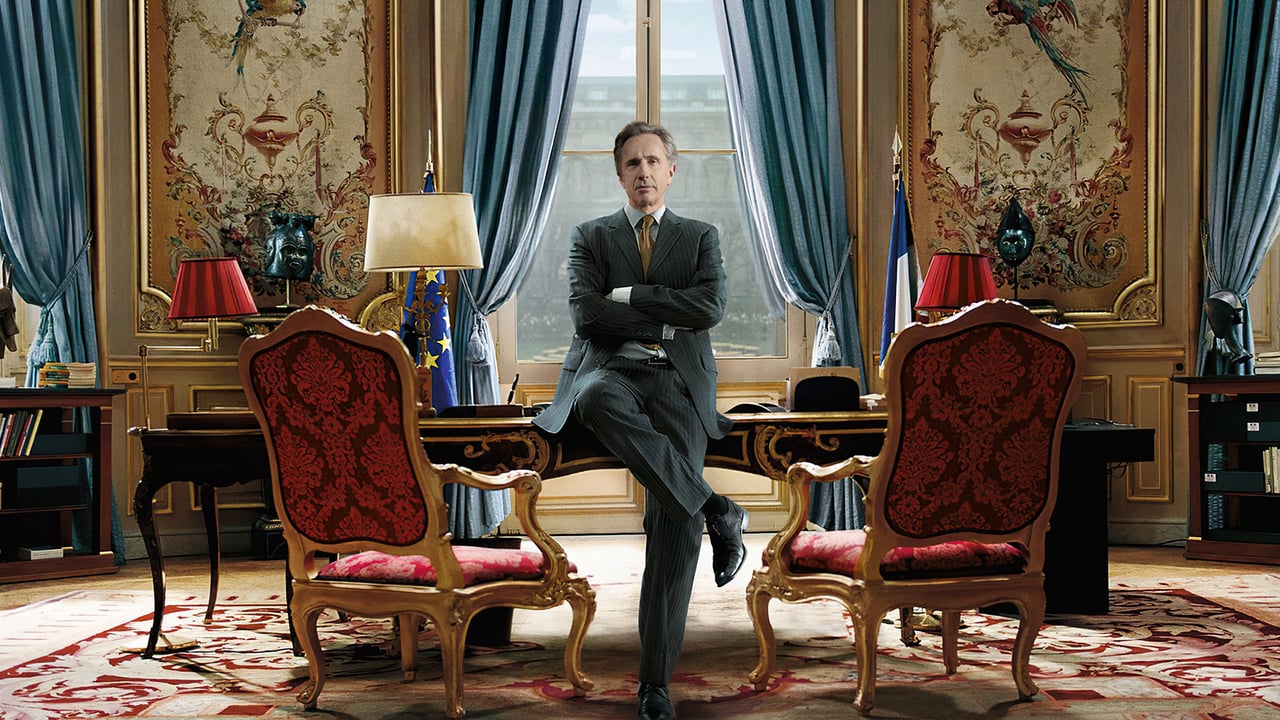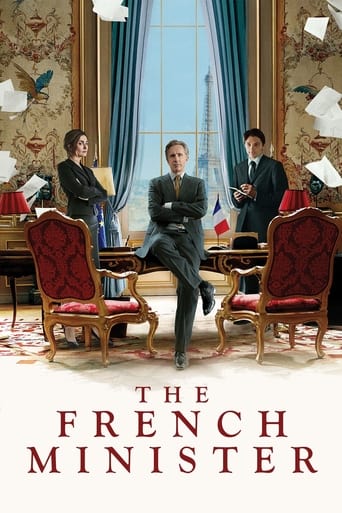

It is odd how the French talent for satire can sometimes give rise to no actual laughter. This film is one of those strange examples. The original French title is QUAI D'ORSAY, and for those who are unfamiliar with the meaning of that, it does not refer to the Musée d'Orsay so dear to all art lovers (which is inside a converted former railway station on the Quai d'Orsay beside the Seine) but to the French Foreign Ministry. Because of its address, the Foreign Ministry has throughout the whole of modern times been referred to by the French as well as all foreign diplomats simply as the 'Quai d'Orsay'. This film is a wildly satirical spoof on the lunacy that the French imagine (and who can say they are wrong?) takes place inside their Foreign Ministry. The Foreign Minister is played with rampant satirical flair and panache by Thierry Lhermitte. He portrays the Foreign Minister as a charming lunatic who constantly contradicts himself, and never, never, never stops talking. He is constantly quoting the ancient Greek philosopher Heraclitus (whose work survives only in fragments, many of which make great quotes), but rarely with relevance. The comedy is enhanced by the film containing many inserted full screen cards giving spoof quotations from Heraclitus which are, of course, nonsensical. If only this film showed the subtlety of satire at which the British excel, but it is too 'in your face' and slapstick. They are just trying too hard to be funny, and although they certainly succeed at being most amusing, I did not laugh once, whereas at a British film of that type I would undoubtedly have laughed often. (As for the Americans, they have never heard of subtlety in satire, and true satire is largely unknown to Hollywood, and is better found in a performance by the Second City group, who have never made it to the screen and remain firmly onstage as satirists.) The finest performance in this film is certainly by the wonderful Niels Arestrup, who despite his Danish name (his father was from Denmark) is as French as they come. He calmly runs the Foreign Ministry and deals with the continually recurring international emergencies amidst all the chaos around him, while his incompetent minister and the other hopeless staff run around in circles like mad dogs. No one ever notices that he is doing this. Let us hope that there is at least one Niels Arestrup in every French Government ministry, for otherwise the country could collapse under the weight of its collective political idiocy. And speaking of idiots, lest we forget the current President Hollande, his girl friend Julie Gayet appears in this film as one of the Foreign Ministry staff, though she makes no big impression. But then perhaps that is because I do not have a motor bike and have never learned her finer points. (Now that is subtle satire for you!) The omnipresent Jane Birkin has a good cameo in this film as a Nobel Prize-winning authoress whom the Minister wishes to meet and takes to lunch but talks so much himself that she does not get a word in. And for Jane not to get a word in is something! Hardly likely in real life. The director of this confection is the distinguished and well known Bertrand Tavernier. I wonder whether the French themselves laughed out loud at this film, and that my own laughless and wholly silent appreciation of it was merely a cultural artefact. Do I lack a Gallic organ? Such thoughts haunt me at nights.
... View MoreIn French culture, 'Quai D'Orsay" refers to French ministry of foreign affairs. It is also the name of a best selling comic book which has been adapted into a major film by veteran director Bertrand Tavernier. This is his first attempt at making a comedy film. He has not disappointed his loyal fans as "The French Minister" is able to make people laugh even when the film's theme appears to be serious. As a film 'The French minister' is largely autobiographical in nature as it is based on writer Antonin Baudry's experiences as a young trainee. In the past, he worked as a speech writer for former foreign minister of France Dominique De Villepin. Tavernier focuses on the mad world of politicians who use too much of academic rigor in order to deal with questions which need a pragmatic, practical approach. He shows that things are so bad at French foreign minister 'Alexandre Teilhard De Worms' office that one can quickly understand that a statement dictated in the morning would end up getting changed in the evening. The film mocks France's attempts to get involved in all major conflicts which happen in the world. It reveals that French government doesn't have proper strategies in place in order to deal with all the world's troubles. The laughter is assured as Tavernier doesn't hesitate a bit in showing the idiotic personalities of people working for French ministry of foreign affairs. Lastly, "The French Minister" displays its concern for genuineness by shooting its security council scenes at the actual UNO site.
... View MoreWhen this movie's good, it's fantastic. Then again, when it's bad, it's overlong, faintly chauvinistic and most definitely thicker than two short planks. But don't get me wrong. It has a lot to recommend it. From an action point of view, this movie's about as much fun as you can have with your pants still on. I mean okay, the movie doesn't give its audience any credit for intelligence, utilising a paper-thin plot to lead us about like a blind man, and the entire cast is really just left to sit around and look pretty. We're getting force-fed bad movies these days and you instantly forget them when you leave the theatre, so it's nice to see a film that doesn't care if you like it or not. You won't be forgetting it in a hurry. It's worth your time.
... View MoreQuai D'Orsay (retitled The French Minister for some markets) is a likable and highly amusing French political farce from director Bertrand Tavernier, perhaps best known for 'Round Midnight. Quai D'Orsay presents the shenanigans within the Ministry of Foreign Affairs with a wonderfully straight face, while delivering laugh-out-loud moments by the portfolio-ful. Thierry Lhermitte's turn as Minister Alexandre Taillard de Worms is delightfully effective, every bombastic centimetre the Gallic Jim Hacker, with no sense of the events around him, yet, unlike Hacker, he is brimful of arrogant confidence in the face of every disaster. His foil is not a scheming Parisienne Sir Humphrey, but his long suffering chief of staff Claude Maupas, excellently portrayed by Niels Arestrup. Enter Raphaël Personnaz as the youthful and politically naive Arthur Vlaminkck, then sit back and chortle as young Arthur learns the workings of the ministry the hard way, doing his best to manoeuvre through the eccentricities of the minister's characterful staff. Quai D'Orsay is an enjoyable film with plenty of smiles and laughs, yet at almost two hours, it does begin to feel a bit baggy after the first half, still well worth seeing however.
... View More